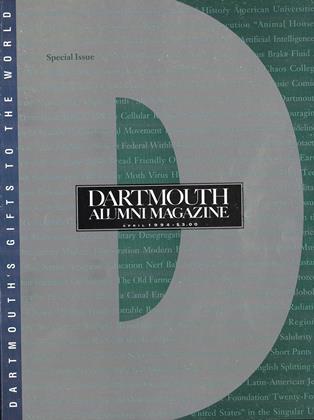In 1815 Dartmouth President John Wheelock started a fight between the College and the state of New Hampshire that went all the way to the Supreme Court and laid one of the cornerstones of American constitutional law.
The president, who was squabbling with his Trustees, asked the legislature to investigate the College. A legislative committee found that Dartmouth's troubles stemmed from an overly independent state charter, and the legislature obliged by changing the name to Dartmouth University.
At the same time, New Hampshire increased the number of Trustees from 12 to 20, with the new members to be appointed by the state. In addition, all decisions by the Trustees were made subject to the approval of a state board of overseers.
Soon Dartmouth became two competing schools: a private college and a state university. In 1817 the Trustees of Dartmouth College sued Dartmouth University Treasurer William Woodward (a nephew of Wheelock) for refusing to hand over the accounts, Trustee records, and charter.
The College retained Daniel Webster 1801 and two other lawyers to represent them before the state superior court. They argued that the abolition of the old corporation and creation of the new was beyond state power, since the federal Constitution forbids states from passing laws that violate the terms of contracts. Unmoved by this argument, the state court decided for the university, and the College Trustees asked Webster to appeal the decision to the United States Supreme Court. Webster's dramatic and heartfelt appeal earned him a spot in the hearts of generations of alumni (and a hefty legal fee that the College had to borrow from friends).
The court eventually decided in the College's favor. Since then, the case has been invoked many times as a landmark that made clear the inviolability of contracts and limits on government action.
Stay back, Webster told the court.
 View Full Issue
View Full Issue
More From This Issue
-
 Cover Story
Cover StoryROSTER OF DARTMOUTH'S GIFTS TO THE WORLD
April 1994 -
 Article
ArticleThe Greatest Books by Dartmouth Authors
April 1994 -
 Class Notes
Class Notes1993
April 1994 By Christopher K. Onken, -
 Class Notes
Class Notes1981
April 1994 By Karen McKeel Calby, -
 Class Notes
Class Notes1989
April 1994 By Dan Parish, -
 Class Notes
Class Notes1983
April 1994 By Deborah Michel Rosch.
Article
-
 Article
ArticleFINAL RESULTS IN BASKETBALL AND HOCKEY
April, 1915 -
 Article
ArticleFootball Movies
January 1940 -
 Article
ArticleGive a Rouse
SEPTEMBER | OCTOBER 2014 -
 Article
ArticleWith The Outing Club
JUNE 1930 By Craig Thorn, Jr. -
 Article
ArticleREPORT FROM THE COUNCIL
FEBRUARY 1989 By Patsy Fisher-Harris '81 -
 Article
ArticleFurther Mention
May 1976 By R.H.R.

